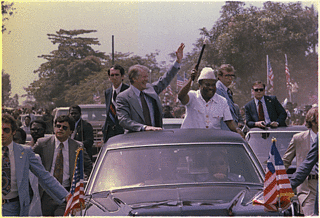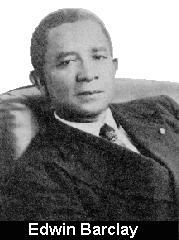Sunday, September 25, 2005
“I have not left the LAP, but I have fully pledged my total support to Mrs. Sirleaf," Mr. Greaves stated.
Harry Greaves Resigns From NTGL AND PLEDGES SUPPORT FOR ELLEN
"Mr. Varney Sherman is an honorable man but Ellen is the best choice for the country,"
Says Harry Greaves
Says Harry Greaves
President William R. Tolbert, Jr.: President of Liberia 1971-1980



William Richard Tolbert, Jr. was born in Bensonville, Montserrado County, on May 13, 1913. His grandfather originated from Charleston, North Carolina, U.S.A. and he and his family had arrived in Liberia in 1879. One of his four children, William R. Tolbert, Sr., had more than 20 children. Partly for this reason, the Tolbert family was one of the largest Americo-Liberian families.
Liberia from 1930 to 1944

The Kru Campaign
Actually, the Kru campaign began towards the end of the King administration. The unsettlement of the population was a result of several factors: rumors saying the Government had lost authority and the Kru Coast would be placed under foreign sovereignty; bitter political canvassing campaign preceding the general election of 1931; resentment of the tribes whose social economy was disturbed by the rigid enforcement of the Act with regard to inter-tribal slavery; and economic distress resulting from the world wide trade depression.
To resolve this situation, Barclay invited the leaders of several tribes involved to Monrovia for an inquiries. The government concluded the unrest was promoted by the tribesmen themselves and not the Liberian Government. The main factors were: disputes over tribal boundaries, power struggles for political supremacy within the tribes; and misrepresentation of the purpose of the Anti-Slavery Act. These misrepresentations included the removal of the Frontier Force and the change in sovereignty. When the government forcse did if fact leave, this spurred the people to believe the rumors were true, and passive resistance toward the Liberian government increased. The tribesmen refused to pay the hut tax, refused to allow movements of the interior tribes to the coast land, and exacted heavy toll on the trade passing through their land. These conditions became the source of conflicts between the tribes.
Barclay dispatched a special Commission with one company of troops to patrol the Kru Coast from Maryland County to Nana Kru. Their mission was to settle conflicts between warring tribes but avoid hostile conflicts at all cost and no reprisals toward any tribe for any reason. The beginning of the endeavor was carried out without incident. As the Commission began traveling up the coast from Maryland, one chief near Sinoe refused passage and a conflict resulted with one man being killed. The passage resumed to Sasstown where Chief Nimley refused to cooperate with a planned meeting of chiefs. The next day, Nimley's tribesmen attacked the Government troops and after seven hours of fighting, the chief's two principle towns were captured and destroyed. Similar unrest was dealt with successfully in Bassa Co. and in some western province without the need for force.
As a result of the tribal unrest, Barcley reorganized the native administration. And a consistent new land policy was established to remove the inequities inherent in the previous policy. All notables of the tribes involved gave approval.
Another situation that was eradicated was the "pawn system." This was the practice of chiefs of certain tribes to send children of their tribe to coastal tribes for work for payment to the chief. By stopping this practice, the interior tribes said they could not generate money for the hut tax. And the carriers, formally pawns, refused to work for the one shilling per day wage.
Little Did We Expect Thomas Woewiyu's Confessions/Revelations:Some Comments
This assessment of the Government of the PRC, with a philosophical vow and commitment to remove it from power, presumably by force of arms, coming from the very person who worked in, with and for that government as cabinet minister and traveled the length and breadth of the nation very closely with the leader that he now described as “irresponsible” and mediocre is, indeed, revealing. These revelations (of “Liberia & Democracy”) not only lend support to and validate Honorable Thomas Woewiyu”s allegations of lethal, political chicanery in which Dr. Fahnbulleh is alleged to be involved, but also demonstrate the presence and level of hypocrisy, disloyalty, deception, lack of dependability & credibility, sabotage, etc., etc. on the Liberian political scene.
The Governance Economic Management Assistance Programme (GEMAP):Liberia under tutelage?
The non-Liberian financial experts will be occupying key-administrative positions in the Central Bank of Liberia and the five main revenue generating agencies:
1. The National Port Authority
2. The Forestry Development Authority
3. The Bureau of Maritime Affairs
4. Robertsfield International Airport
5. The Liberia Petroleum Refining Corporation.
GEMAP is an anti corruption document which - though negotiated by the transitional government - was imposed by international donors1) willing to assist the country in its reconstruction and recovery programme after the end of the civil war, but who saw the funds being diverted from their use because of theft, embezzlement, fraud and other financial corruption.
1. The National Port Authority
2. The Forestry Development Authority
3. The Bureau of Maritime Affairs
4. Robertsfield International Airport
5. The Liberia Petroleum Refining Corporation.
GEMAP is an anti corruption document which - though negotiated by the transitional government - was imposed by international donors1) willing to assist the country in its reconstruction and recovery programme after the end of the civil war, but who saw the funds being diverted from their use because of theft, embezzlement, fraud and other financial corruption.


